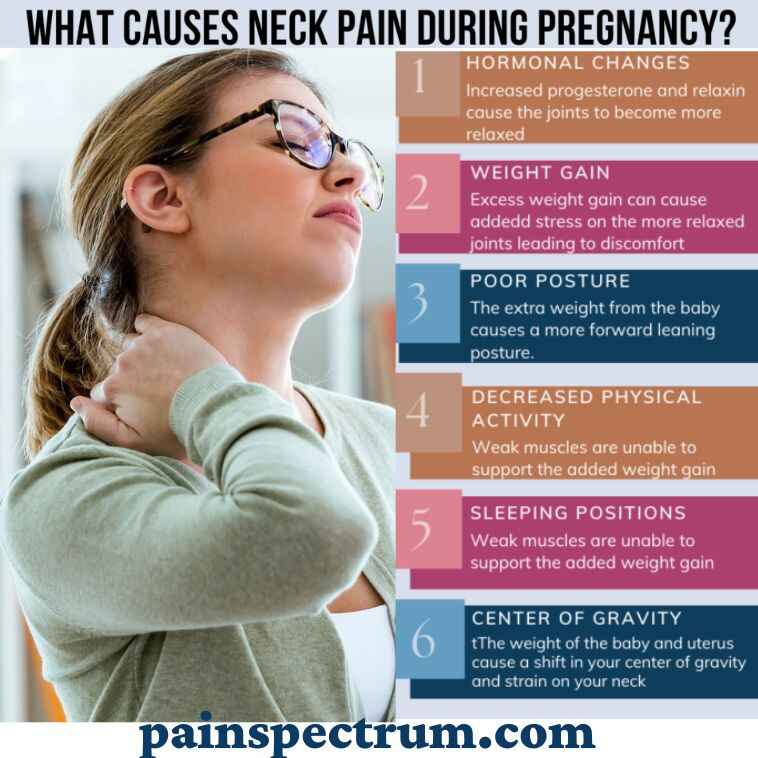
Neck Pain During Pregnancy: 12 Best Remedies
Last updated on January 29th, 2026 at 03:32 am
Neck pain during pregnancy is a common complaint among expectant mothers. This discomfort can range from mild to severe and often affects daily activities. In this comprehensive guide, we will explore the causes, remedies, and preventive measures for neck pain during pregnancy. Our goal is to provide you with easy-to-understand information and practical tips to help you manage and alleviate neck pain during this special time.
Table of Contents
Common Causes of Neck Pain While Pregnant
Understanding the causes of neck pain during pregnancy can help you take the right steps to prevent and treat it. Here are some of the most common reasons:

- Hormonal Changes: Increased levels of relaxin and other hormones can loosen ligaments, affecting neck stability and causing discomfort.
- Weight Gain: As pregnancy progresses, the added weight can shift the body’s center of gravity, leading to strain on the neck muscles and ligaments.
- Postural Changes: Accommodating a growing belly often alters posture, putting additional stress on the neck and upper back muscles.
- Muscle Tension: Emotional stress during pregnancy can contribute to muscle tension in the neck and shoulders, exacerbating pain.
- Poor Ergonomics: Incorrect posture while sitting, standing, or sleeping can strain neck muscles, increasing the likelihood of pain.
- Repetitive Movements: Regular activities and movements that involve repetitive motions, such as lifting or carrying items, can strain the neck muscles, especially as the body changes during pregnancy.
Types of Neck Pain During Pregnancy
Neck pain during pregnancy can manifest in various ways, each with its characteristics and implications. Understanding these different types can help you identify the nature of your discomfort and seek appropriate treatment. Here are the primary types of neck pain you might experience during pregnancy:
Acute vs. Chronic Pain
Acute neck pain starts suddenly and is very intense. It often happens quickly, maybe after a specific activity or a sudden movement. This pain usually lasts a short time, from a few days to a couple of weeks, and can feel sharp, stabbing, or throbbing. It can be caused by muscle strain, ligament sprain, or minor injuries. Poor posture or a sudden awkward movement can also cause this type of pain.
Chronic neck pain lasts for a long time, often several weeks, months, or even longer. Unlike sudden pain, it usually starts slowly and gets worse over time. This pain can be constant or come and go, changing how intense it feels. Chronic pain can be caused by problems like poor posture, repetitive strain, arthritis, or disc issues. Hormonal changes and physical stress during pregnancy can also make chronic pain worse.
Localized Pain
Localized neck pain is discomfort that is restricted to a specific part of the neck. It might be centered around the cervical spine, at the base of the skull, or in the neck muscles. Because this pain is confined to a particular area, it is often easier to identify the cause, such as a muscle knot, tension, or an injury. This type of pain can usually be effectively managed with targeted treatments like massage, physical therapy, or localized heat or cold therapy.
Radiating Pain
Radiating pain starts in the neck and spreads to other areas like the shoulders, upper back, or down the arms. It can feel like shooting or burning. This pain often means a nerve is involved, like when a pinched nerve in the neck causes pain to spread along the nerve’s path. You might also feel numbness, tingling, or weakness in these areas, which can be more worrying during pregnancy. If you have radiating pain, it’s important to see a doctor to find out the cause and prevent more problems.
Read More: Axial Neck Pain
When Should You Call Your Doctor About Pregnancy Neck Pain?
While neck pain during pregnancy is usually not a cause for concern, there are times when you should seek medical advice:
Warning Signs and Symptoms
- Severe or Persistent Pain: If your neck pain is severe or does not improve with home remedies.
- Numbness or Tingling: If you experience numbness, tingling, or weakness in your arms or hands.
- Headache and Fever: Accompanied by a headache, fever, or other unusual symptoms.
Conditions Indicated by Neck and Shoulder Pain
Neck pain with shoulder pain and spotting could mean an ectopic pregnancy, which is very serious. Severe neck stiffness and headache might be signs of meningitis, a serious infection. Also, severe neck pain with high blood pressure could be preeclampsia, a serious pregnancy problem. If you have these symptoms, it’s important to see a doctor right away for help.
How Chiropractic Care Can Help
Chiropractic care can be beneficial for relieving neck pain during pregnancy. Chiropractors use gentle adjustments to align the spine and joints, which can help reduce muscle tension and improve mobility in the neck and upper back. This can alleviate discomfort caused by the changes in posture and weight distribution during pregnancy.
Additionally, chiropractors can provide advice on posture, exercises, and ergonomic adjustments to further manage and prevent neck pain. It’s essential to consult with a healthcare provider before starting chiropractic care during pregnancy to ensure safety and effectiveness.
Choosing a Qualified Chiropractor
- Specialization: Look for a chiropractor who specializes in prenatal care.
- Credentials: Ensure that the chiropractor is licensed and has experience treating pregnant women.
Benefits of Prenatal Chiropractic Adjustments
- Pain Relief: Reduces neck, back, and shoulder pain.
- Improved Mobility: Increases range of motion and flexibility.
- Enhanced Well-being: Promotes overall health and well-being during pregnancy.
Regenerative Medicine
Regenerative medicine is a new area of healthcare that offers treatments for neck pain during pregnancy by harnessing the body’s natural healing abilities. It includes methods like stem cell therapy, which uses stem cells to help repair tissues and reduce inflammation, and platelet-rich plasma (PRP) therapy, which uses your blood platelets to speed up healing.
However, it’s crucial to talk to your doctor before considering any regenerative treatments while pregnant. Make sure the treatment is safe and backed by scientific research to ensure both your safety and the baby’s well-being.
Support to Prevent Back and Neck Pains During Pregnancy
To prevent back and neck pain during pregnancy, it’s important to focus on a few supportive steps. First, pay attention to your posture by sitting and standing straight to lessen strain on your back. Choose comfy, supportive shoes that help balance your weight evenly.
Gentle exercises like walking or prenatal yoga can strengthen your back and belly muscles, giving better support to your spine. Use pillows for extra support when sitting or sleeping, and try not to lift heavy things to avoid straining your muscles. Applying a warm or cold pack can also help ease any discomfort.
Lastly, make sure to see your doctor regularly for check-ups to discuss any pain and get advice tailored to your needs. These steps can help you stay more comfortable during pregnancy.
12 Remedies for Treating Neck Pains During Pregnancy
- Gentle Exercises: Incorporate gentle neck stretches into your daily routine to relieve tension and improve flexibility, ensuring to avoid any strain on your belly.
- Heat Therapy: Use a warm compress on the sore area to relax muscles and increase blood circulation, helping to alleviate discomfort.
- Cold Therapy: Apply a cold pack wrapped in a cloth for short intervals to reduce inflammation and numb the pain in your neck area.
- Ergonomic Support: Invest in a supportive pregnancy pillow to maintain proper neck alignment while sleeping, minimizing strain on your neck and shoulders.
- Professional Massage: Consider a prenatal massage from a certified therapist who specializes in pregnancy-related pain relief, ensuring it’s safe for you and your baby.
- Hydration and Nutrition: Stay well-hydrated and maintain a balanced diet to support healthy muscles and reduce the risk of cramps and stiffness.
- Alternative Therapies: Explore acupuncture sessions with a qualified practitioner to target specific pain points and promote overall relaxation.
- Do Prenatal Yoga: Prenatal yoga is great during pregnancy. It helps with posture, strengthens muscles, and reduces stress. You can join a class or find tutorials online made for pregnant women.
- Take Magnesium: Taking magnesium can help relax muscles and ease pain during pregnancy. It’s important to talk to your doctor before starting any supplements to make sure it’s safe for you and your baby.
- Use a Back and Neck Support Pillow: Use a pregnancy pillow to support your neck and back while sleeping.
- Get Adjusted by A Chiropractor: Regular chiropractic adjustments can relieve pressure and improve alignment.
- Medical Consultation: If neck pain persists or worsens, consult your healthcare provider for personalized guidance and potential referrals to specialists.
How to Relieve Neck Pain During Pregnancy
To alleviate neck pain during pregnancy, diversify your approach. Incorporate warm compresses alternated with cold packs to manage pain and swelling effectively.
Prenatal yoga can enhance flexibility and reduce stress while consulting your doctor about magnesium supplements may safely relax muscles.
Adjust sleeping habits with a supportive pregnancy pillow to maintain proper neck alignment and manage weight gain.
Seek professional treatments such as chiropractic adjustments to align your spine, prenatal massages to relieve muscle tension, and acupuncture to target pain points specifically.
Always discuss any new treatments with your healthcare provider to ensure their safety during pregnancy.
DIY Neck Pain Remedies for Pregnant Women
Neck pain during pregnancy can be helped with some easy home remedies. First, fix your posture by making your workspace and home more comfortable and practicing good posture habits.
Using warm and cold compresses can also help—use warm ones to relax muscles and cold ones to reduce swelling. A pregnancy support pillow can help you sleep better by supporting your neck and back.
Gentle neck exercises every day can make your neck more flexible and less tense. You can also use a tennis ball to massage your neck and relieve tight muscles.
Lastly, ask your partner to give you a gentle neck massage to ease the pain. These simple tips can make a big difference in reducing neck pain and making you more comfortable during pregnancy.
Neck and Back Pain in Each Trimester
Neck and back pain can change as your pregnancy progresses. In the first trimester, hormonal changes and early weight gain can cause pain. To help with this, focus on good posture and gentle exercise.
In the second trimester, as you gain more weight and your body changes, the pain can get worse. Using supportive pillows and doing prenatal yoga can help. In the third trimester, the baby gets bigger and puts more strain on your neck and back.
Keep using supportive measures and talk to your healthcare provider for more pain relief options. Knowing what to expect and using these tips can help manage neck and back pain during pregnancy.
Supportive Products for Neck and Back Pain
Investing in supportive products can significantly help manage neck and back pain during pregnancy. Full-body pregnancy pillows offer excellent support for your neck, back, and belly. Using ergonomic furniture, such as an office chair with good lumbar support and a footrest, helps maintain proper posture while sitting.
Additionally, maternity support belts can distribute the weight of your growing belly, reducing strain on your back and neck. These supportive products can make a big difference in your comfort during pregnancy.
When to Seek Professional Help
Seek professional help if:
- Your neck pain is severe or persistent despite home remedies.
- You experience numbness, tingling, or weakness in your arms or hands.
- Your neck pain is accompanied by headache, fever, or other unusual symptoms.
- You have specific conditions like spotting with neck and shoulder pain, severe neck stiffness with headache, or high blood pressure, which may indicate serious issues like ectopic pregnancy, meningitis, or preeclampsia, respectively.
Types of Professionals to Consult
- Physiotherapists: Can provide tailored exercises and treatments.
- Chiropractors: Specialize in spinal adjustments and posture correction.
- Massage Therapists: Offer prenatal massage to relieve muscle tension.
Innovative Treatments and Approaches
Innovative treatments for neck pain during pregnancy include:
- Virtual Physical Therapy: Provides personalized exercises and guidance remotely.
- Mind-Body Therapies: Such as mindfulness and relaxation techniques.
- Water Therapy: Aquatic exercises for gentle relief.
- Chiropractic Care: Safe adjustments to improve spinal alignment.
- Acupuncture and Acupressure: Targeted therapies for pain relief.
Always consult your healthcare provider before trying any new treatments during pregnancy.
Frequently Asked Questions
How to Help with Neck Pain While Pregnant?
- Here are some tips to help alleviate neck pain:
- Maintain good posture.
- Use pillows for support while sleeping.
- Apply heat or cold packs.
- Practice gentle neck exercises.
- Stay hydrated and stay active with low-impact exercises like yoga or swimming.
Is Neck Pain Normal During Early Pregnancy?
Neck pain can occur during early pregnancy due to hormonal changes, increased blood volume, and changes in posture. It’s a common symptom, but if severe or persistent, it’s best to consult a healthcare provider to rule out any underlying issues.
Can Pregnancy Cause a Pinched Nerve in the Neck?
Yes, pregnancy can potentially cause a pinched nerve in the neck. This can happen due to changes in posture, increased weight, and hormonal changes leading to ligament laxity, and swelling. If you suspect a pinched nerve or experience persistent neck pain during pregnancy, it’s advisable to consult a healthcare provider for proper evaluation and management.
Why Do I Wake Up with a Stiff Neck While Pregnant?
You might wake up with a stiff neck during pregnancy because of changes in sleeping positions, hormonal shifts, the extra weight you’re carrying, or stress.
Can You Massage a Pregnant Woman’s Neck?
Yes, you can massage a pregnant woman’s neck, but it should be done with caution and by someone trained in prenatal massage techniques. Gentle and supportive massage can help alleviate neck tension and discomfort during pregnancy.
Always ensure the pregnant woman is comfortable and consult with a healthcare provider if there are any concerns or specific conditions to consider.
Can I Use a Heating Pad on My Neck While Pregnant?
Yes, you can use a heating pad on your neck while pregnant. Just keep it on a low to medium setting and limit use to about 15-20 minutes at a time.
Does Neck Pain Mean Ectopic Pregnancy?
No, neck pain is not typically a symptom of ectopic pregnancy. Ectopic pregnancy is characterized by symptoms such as pelvic pain, vaginal bleeding, and shoulder pain. If you suspect an ectopic pregnancy or experience severe symptoms, it’s important to seek medical attention promptly for evaluation and care.
What Pain is Bad in Early Pregnancy?
In early pregnancy, any severe or persistent pain should be taken seriously. Here are some types of pain that could indicate a problem and should prompt you to seek medical advice:
- Severe Abdominal Pain: Especially if it’s accompanied by cramping, bleeding, or fever.
- Painful Urination or Lower Abdominal Pain: These could be signs of a urinary tract infection (UTI).
- Severe Headaches: Particularly if they are persistent or accompanied by vision changes, nausea, or dizziness.
- Severe Back or Pelvic Pain: Especially if it’s sudden or accompanied by fever, chills, or vaginal discharge.
- Sharp or Intense Pain in the Pelvic Area: This could potentially indicate an ectopic pregnancy or miscarriage.
- Chest Pain or Difficulty Breathing: These symptoms could indicate a serious condition like a blood clot.
How to Sleep with Neck Pain?
- Use a supportive pillow.
- Keep your neck aligned with your spine.
- Try sleeping on your back or side with a pillow between your knees.
- Gently stretch your neck muscles before sleeping.
Why Does My Shoulder Neck Hurt When Pregnant?
Shoulder and neck pain during pregnancy can happen because of changes in posture, hormones making your ligaments looser, bigger breasts adding weight, stress, and trouble finding a comfy sleeping position. Stretching gently, keeping good posture, using supportive pillows, and trying prenatal massages might help.
Conclusion
neck pain during pregnancy is a common issue caused by hormonal changes, weight gain, and altered posture.
To alleviate discomfort, maintaining good posture, using supportive pillows, applying heat or cold therapy, and exploring safe treatments like chiropractic care or prenatal massage are effective strategies.
It’s essential for expectant mothers to consult healthcare providers for personalized guidance and to address any concerning symptoms promptly.
By incorporating these measures, women can better manage neck pain and enjoy a more comfortable pregnancy journey.


